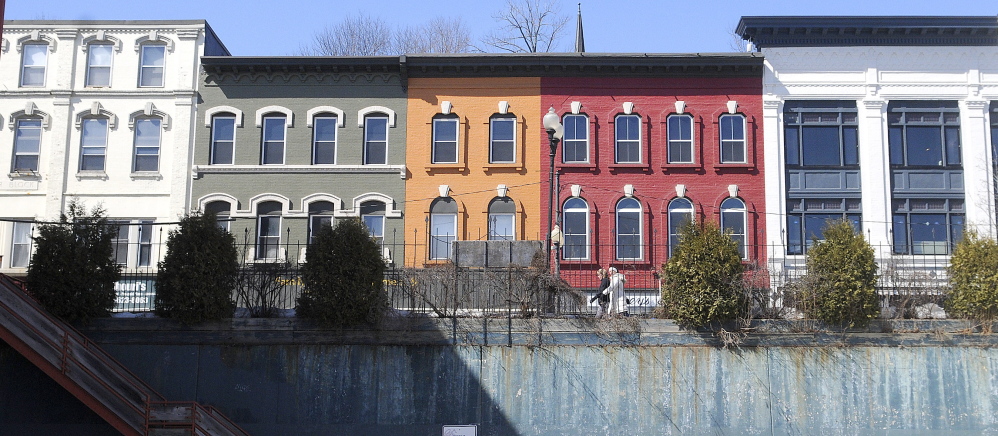AUGUSTA — City property owners asked dozens of questions Tuesday at a forum focused on a proposed historic district ordinance at the Buker Community Center.
More than 80 people turned up at what Mayor Dave Rollins counted as at least the 10th public meeting or hearing on the issue.
City councilors have yet to vote on the proposed ordinance, which carries a unanimous recommendation for passage from the city’s Planning Board.
Questioners wanted to hear about the restrictions, the procedures, the timelines and the effects on the community.
The moderator, Daniel Wathen, a former chief justice of the Maine Supreme Court who lives on the city’s east side and whose property would not be affected by the ordinance, said the forum’s intent was to provide information.
“We’re not seeking to change anyone’s mind, just to make sure you folks are better informed when you left than when you arrived,” he said.
The proposed ordinance would create a locally designated historic district that encompasses two existing designated National Historic Districts surrounding Winthrop and Crosby streets. It includes the downtown Water Street area north until just beyond Bond Street and south as far as a small portion of Western Avenue at Memorial Circle. It includes homes and other buildings along parts of State, Green, Bridge, Chapel, Melville, South Chestnut, North Chestnut, Spring, Winter, Summer and other streets.
The proposed ordinance lists as its intent “to safeguard, in the face of intensified growth pressures, the structures and areas that give beauty and pleasure to residents, attract visitors and new residents, give the city its distinctive character, and educate the community about its past.”
Jennifer Bryant, an attorney representing the board of the Bread of Life Ministries, said that organization, which has three buildings in the proposed historic district on Water Street, opposes the ordinance.
She said the board recently renovated 159 Water St. and is committed to having safe buildings. However, she said the board “is concerned that this action is going to increase their costs.”
She asked if the proposed ordinance could be revised at this point.
One woman said she was attending on behalf of Steven Goedecke, who owns three buildings in the district, two of them considered “contributing.”
“These are not buildings he would have purchased under these rules,” she said. She also said an attorney read the proposed ordinance at Goedecke’s request and recommended opposing it.
Kim Mondonedo, of Topsham, said she serves on that town’s Historic District Commission and urged those at Tuesday’s meeting to embrace the concept. “It seems really, really workable for people who live in the district,” she said.
Spring Street resident Cheryl Clukey, too, said she was in favor of the proposed ordinance: “I think it protects the integrity of the neighborhood.”
Wathen, however, said this was not an advocacy forum, but a way for people to get their questions answered.
Wathen also responded directly to Kathleen “Sukey” Sikora, who asked, “What gives you the right to tell a homeowner that they have to go to a seven-person board to get permission to do something to their property?”
“Property rights are not absolute,” said Wathen, an attorney for 50 years. “They’re sort of a bundle of rights, like a bundle of reeds or a bundle of arrows. A deed may be subject to an easement, a piece of right taken out of that property or a covenant not to use the property for certain reasons.” He said the city’s adoption of zoning took away some of the rights.
“Property rights are not absolute,” he repeated. “It’s a hard concept to grasp, but it is the law.”
Jane Adams said she had begun replacing the windows at her 127 Winthrop St. home and changed the window style somewhat. She asked if she could continue the work — and was told yes, depending on the timing.
Chapel Street resident Tim Bolton asked for the definition of “contributing” versus “noncontributing” buildings and the effects those designations would have on his properties.
Deb Andrews, a panelist who has managed Portland’s historic preservation program since 1992, said noncontributing buildings were those “erected within the last 50 years or a historic structure so altered over time that its original form and details are irreversibly lost or significantly changed.”
She said contributing buildings “tell the story of the evolution of the neighborhood, retain a good bit of features or form.”
Another panelist, Chris Closs, field adviser for Maine Preservation, said there were benefits both large-scale for the community or region, such as economic benefits, and smaller-scale for the property owner, including tax credits for qualified projects.
“Property values within historic districts tend to stabilize and rise more quickly over time,” he said. “Values recover more quickly after a recession, and they fall more slowly when going into a recession.” He said property within the district generally sees “a more favorable resale.”
He said a historic district designation does not appear to drive up costs, and he told the attendees to avoid confusing restoration with preservation.
He said restoration involves higher, museum-quality standards. “That’s not what this ordinance is intended to do. Preservation tries to stimulate sensitive rehabilitation.”
Betty Adams — 621-5631
Twitter: @betadams
Copy the Story Link
Send questions/comments to the editors.




Success. Please wait for the page to reload. If the page does not reload within 5 seconds, please refresh the page.
Enter your email and password to access comments.
Hi, to comment on stories you must . This profile is in addition to your subscription and website login.
Already have a commenting profile? .
Invalid username/password.
Please check your email to confirm and complete your registration.
Only subscribers are eligible to post comments. Please subscribe or login first for digital access. Here’s why.
Use the form below to reset your password. When you've submitted your account email, we will send an email with a reset code.